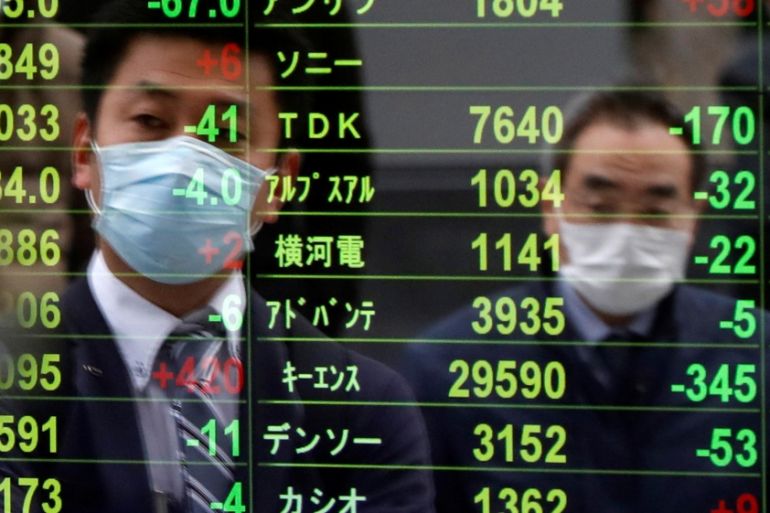Heading south: Stocks resume losses as virus pessimism lingers
Investors say governments worldwide have not done enough to contain coronavirus spread.

Kuala Lumpur, Malaysia – Investors vote with their money, and the message they seem to be sending policymakers this week appears to be loud and clear.
Even though governments from the United States to Australia are pledging trillions of dollars to protect their economies from the ravages of the coronavirus, steep falls in shares, oil and bond markets on Wednesday suggested their proposals may not be enough to prevent a global recession.
Keep reading
list of 3 itemsJapan’s Abe to launch panel to mull big stimulus package: Report
Governments offer airlines aid as coronavirus forces flight cuts
In Asia and Europe, stocks resumed their slide down, as key gauges indicated another sharply lower open for US share markets.
Oil prices fell towards their lowest levels in more than four years.
US President Donald Trump said on Tuesday his administration is trying to push a stimulus spending package through Congress of more than $1 trillion, including direct payments of $1,000 or more to Americans within two weeks as part of plans to protect the economy and people affected by the pandemic.
“I think what the US government has done is not enough. They are not determined enough to overcome this virus,” Ang Kok Heng, chief investment officer at Phillip Capital Management in Kuala Lumpur, told Al Jazeera.
“You should not talk about the economy any more. If the world comes to a standstill and sleeps for two months, when you wake up it will be moving again. Even if there’s a recession, it’s not so important,” Ang said.
Losing momentum
The proposal helped US stocks stage a rebound from the previous day’s huge losses, with the S&P 500 closing almost 6 percent higher on Tuesday. The index is a gauge of the health of US pension accounts and college savings plans.
But the upward momentum did not sustain as governments around the world struggled to put a stop to the rising death toll from the viral outbreak.
S&P futures, financial contracts which allow investors to speculate on the direction of the S&P 500 index of US stocks, fell 3.7 percent in Asian trade on Wednesday to hit their daily lower limit.
In Asia, Australian stocks led the region’s losses. The nation’s benchmark S&P ASX 200 Index tanked 4.63 percent to levels last seen in April 2016, according to Refinitiv data.

Prime Minister Scott Morrison imposed a travel ban and declared an emergency that will allow the government to close off cities and implement other movement restrictions.
“Stocks in Australia are heavily bank- and resource-sector weighted, and those two sectors are in the front line of the coronavirus slowdown,” Jeffrey Halley, senior market analyst for Asia Pacific at OANDA, told Al Jazeera.
Elsewhere, Japan’s main stocks gauge, the Nikkei 225 index, rose 2.12 percent, while the Straits Times Index in Singapore gained 1.2 percent.
Hong Kong’s Hang Seng Index dropped 1.11 percent, while China’s benchmark Shanghai Composite was little changed at 0.07 percent.
In Europe, Germany’s XETRA DAX index led the region lower with a 4.7 percent plunge by 08:30 GMT, while shares in the United Kingdom and France were more than 3 percent down.
Oil prices slid further as a price war between top producers Saudi Arabia and Russia shows little signs of abating. Brent crude was down more than 1.6 percent as it headed towards its 2016 low of slightly more than $26 a barrel.
Recession around the corner?
Economic rescue packages and stimulus spending are being planned by governments around the world in a bid to cushion the economic fallout as prospects of a coronavirus-induced global recession loom. Economists define a recession as two consecutive quarters of economic contraction.
Globally, the coronavirus has infected nearly 185,000 people and killed more than 7,500, according to the World Health Organization (WHO).
Investors, companies and banks are hoarding cash, OANDA’s Halley said, limiting any rallies in stock prices.
Data released in recent days offered a glimpse of the extent of the economic slowdown in various countries.
China’s retail sales plummeted 20.5 percent in the first two months this year compared with the same period in 2019, according to figures published by National Bureau of Statistics of China on Monday, while industrial output posted its biggest fall in 30 years.
‘A very big deal’
“The bad data readings for January and February confirm the view we’ve held since the start of the Covid-19 outbreak that the epidemic would be a very big deal for the Chinese economy,” Diana Choyleva, chief economist at Enodo Economics, wrote in a note.
Economic activity in China is likely to remain very weak in the second quarter “because although China is showing some signs of recovery, disruptions to domestic production could linger and there’s now the threat of an external demand shock as economic activity in Europe and the US grinds to a halt.”
Similarly in Japan, surveys and recent data show that the economy is in the midst of a deep downturn, analysts said.

Figures published on Wednesday showed that Japan’s exports slipped for a 15th month in February, dropping 1 percent from a year earlier.
“Cinema sales, restaurant reservations and the Economy Watchers Survey all point towards consumer spending having collapsed at the end of last month,” Tom Learmouth, who covers the Japanese economy at Capital Economics, wrote in a note.
“The economic situation is likely to deteriorate further in the near term as more people decide to stay at home and as demand from Japan’s trading partners plunges,” he said.
Quoting an unidentified Japanese government official, Reuters News Agency reported that Prime Minister Shinzo Abe will form a panel to put together a large economic stimulus package.
Still, some investors said temporary economic pains may be necessary to weather the health crisis and global governments need to take more aggressive measures, such as those China carried out to stop the virus from spreading further.
While interest rate cuts, liquidity-boosting measures and stimulus spending help to cushion the blow, the key lies in effectively controlling the epidemic, they said.
Phillip Capital’s Ang said China, South Korea and Italy have done well in containing the spread of the virus, while other countries appear to be less decisive.
“Yes, some companies may face difficulty or go under if they have cash flow issues, and that’s why the governments need to help.”